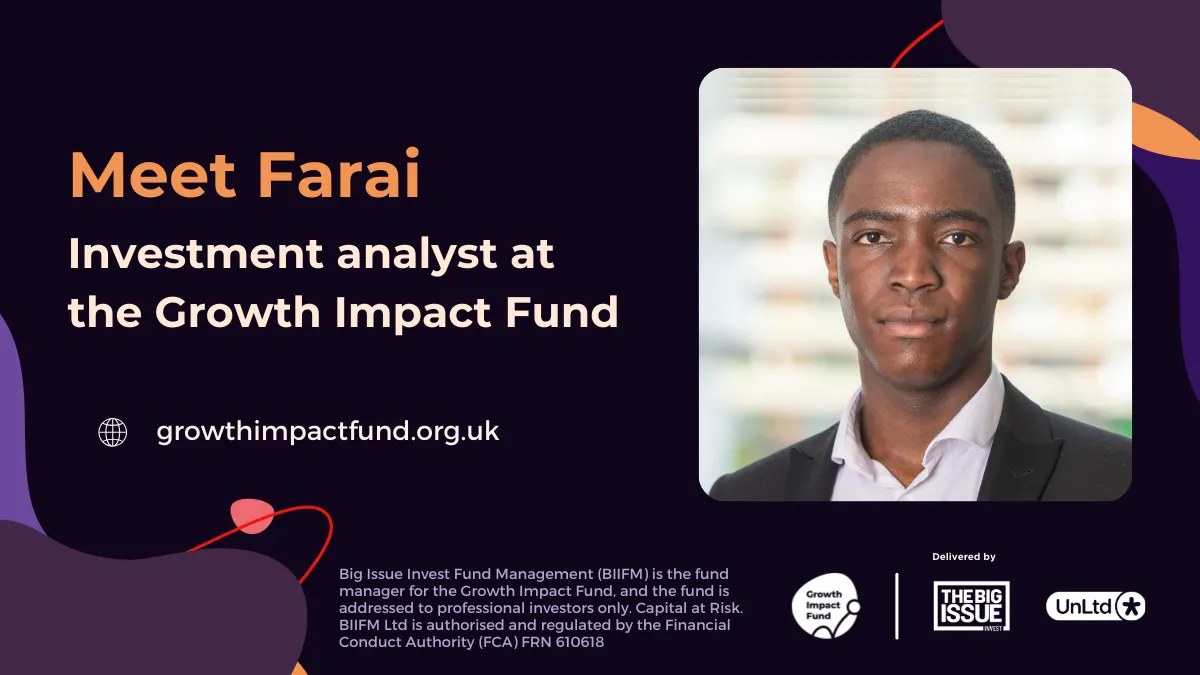
Day in the Life of an Investment Analyst
In this blog, investment analyst Farai Nyadundu shares more about his day-to-day experience supporting diverse-led businesses in the Growth Impact Fund.
By Tom Sheppard, Digital Manager
Tell me a bit about your background and why you joined the Growth Impact Fund (GIF).
Before joining GIF, I worked in investment operations in the pensions sector. I enjoyed this, and it taught me a lot that I use in my current role, but I slowly felt that I wanted to be closer to the impact of investments. I enjoy building relationships and was looking for a role where I could work more closely with businesses and founders to really understand their problems and get involved in providing solutions that worked for them.
I’d also recently become a trustee for Crossroads Care Gloucestershire — a charity that supports unpaid family carers. This opened my eyes to the number of organisations providing pivotal services to address today’s social issues, who really deserve and need the attention of investors to sustain this.
I realised that there is a whole world dedicated to investing in organisations like this — and the Growth Impact Fund was a perfect route into that.
What is a typical working day like for you? How do you think that reflects the Fund’s desire to do things differently to “business as normal” social investment?
I’m always working with several organisations at any given time, and they can be at different stages of the investment process. This means my typical day is varied. I’m often having initial meetings with founders applying to the Fund, to understand more about their businesses. I’m also involved in taking them through the due-diligence process, which might mean I’m doing more detailed financial and impact analysis, as I move towards presenting deals to committee.
I’m lucky enough to be involved at each stage of this process. I get to see so many organisations across different industries doing great jobs at addressing inequality in the UK — organisations like chocolate makers Harry Specters, who are supporting young autistic people into work, who I recently worked alongside.
Because we’re an impact and equality fund, we try to innovate on the traditional investment process, knowing the extra barriers our audience faces to raising money.
The most obvious way this shows up in my day-to-day work is in the relational approach we take to evaluating businesses. We know that our audience value 1-to-1 contact with the investment team, to help them unpack their business in their own terms and overcomes obstacles to investment together. I’m able to spend lots of time with founders. Working with Harry Specters, for instance, I was able to visit their factory, see how they worked, and have conversations with their team. I really see the benefits of this approach.
As we move through the investment process, I notice that founders express themselves more authentically, with a level of transparency that really helps us both. Strong relationships help them feel comfortable to share their own vulnerabilities — founders reveal things to us which other commercial investors might (unfairly) take as red flags and they are really open about the challenges to raising investment they’ve faced in the past.
This has two real benefits. Firstly, it helps us tailor deals, the (pre and post) investment support we can offer, and our way of communicating with founders, to meet the authentic challenges they are facing — challenges which might not surface when there are poor relationships and less transparency.
Secondly, this approach means we’re surfacing feedback in a consistent and organic way and able to adapt the fund quickly in response. I don’t think many other funds do this so well. We really value feedback from our applicants, and I feel part of this process of continually making the fund better.
That isn’t to say that our attempt to innovate is without challenges. We’ve got many people involved in the fund — different groups to provide a range of views which reduce potential bias in our process and to balance our obligations to our audience with our duty of care we have to our own investors. It’s not always easy to get this balance right and satisfy all stakeholders in the fund, while retaining what the Fund is set up to do. I know we’re learning as we go, though, and we’ve shared more about this in our latest learning report.
What’s been most rewarding about your role?
Helping take an organisation all the way from application to investment.
I like being able to see the before, during and after with an investment. Given the number of meetings we have with founders, and the financial and social analysis we do ourselves, you naturally develop a strong relationship with the team, and you really do end up vouching for them and their business.
We’re building up a portfolio now of organisations making tangible impact in the UK, like Neuropool, DWRM and Harry Specters and it’s really exciting. I’ve been shocked by some of the issues they’re working against, the fact that up to 85% of people with autism aren’t in full-time employment — it’s rewarding to know we’re supporting an organisation like Harry Specters to help solve that.
What are you looking forwards to in the coming months?
I’m looking forward to helping build out the portfolio, close deals and see the growth journey of those organisations as they tackle inequality. I’m also interested in how those things compare against our own KPIs and knowing we’re doing what we set out to!
Finally, as someone who grew up in Aberdeen, Scotland, I’ve seen how London-centric things can be — all the opportunities are there. I’m keen to see the effects of our “Northern Tour”. We’re trying to reach out to organisations in the North, who can be disadvantaged in the investment world, and I’m interested in who we can find when we reach out to the different corners of the country.